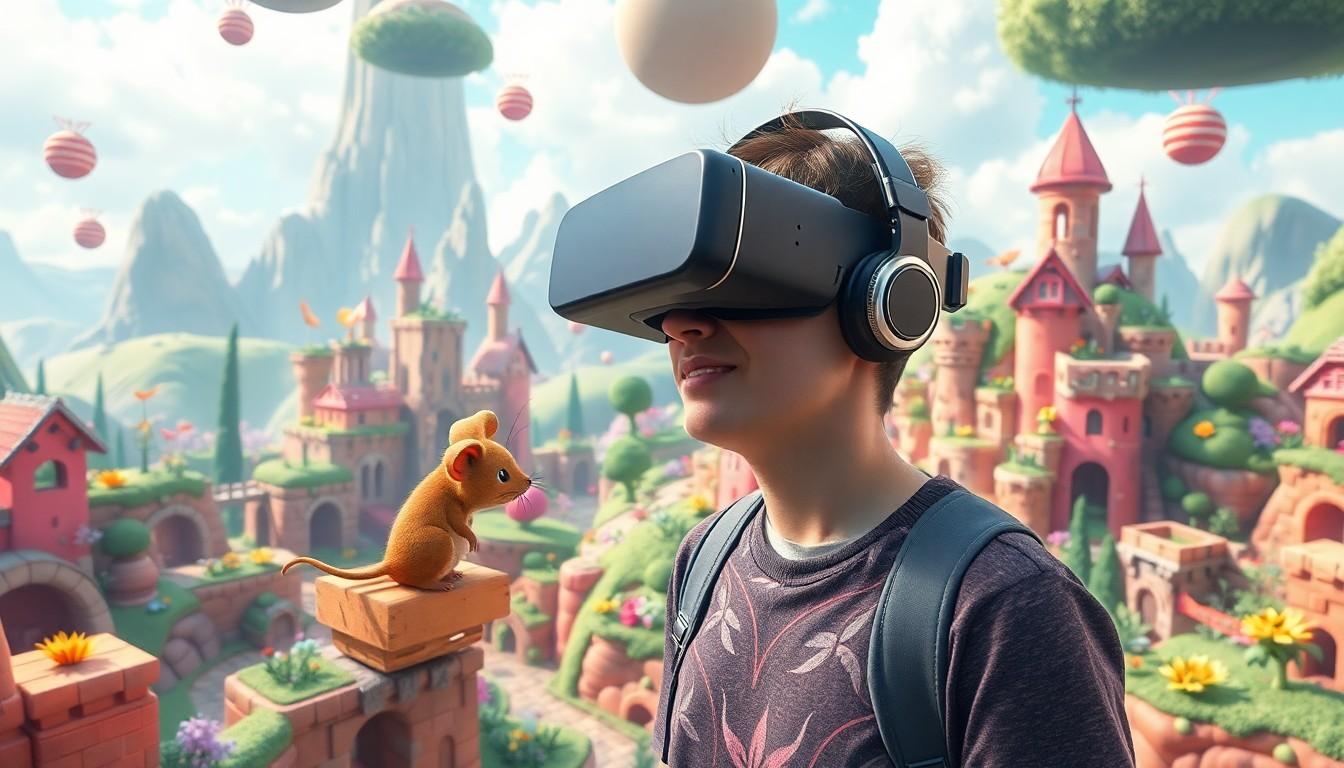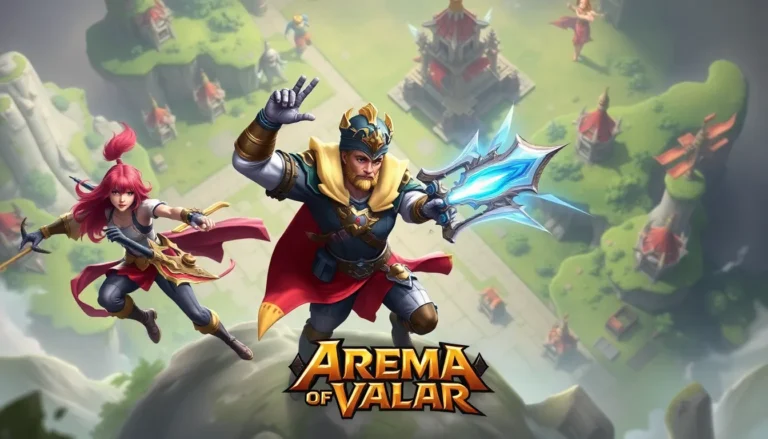Imagine stepping into a world where your brain gets a workout and your avatar doesn’t have to sweat it out at the gym. VR puzzle games are the perfect blend of challenge and fun, transporting players into mind-bending environments that’ll make them question their sanity—while laughing all the way.
Table of Contents
ToggleOverview of VR Puzzle Games
VR puzzle games offer immersive experiences that engage players in complex problem-solving scenarios. Players enter lifelike environments that require critical thinking and creativity. Challenges often range from simple tasks to intricate puzzles, providing something for everyone regardless of skill level.
When players navigate these virtual worlds, they encounter unique mechanics that enhance gameplay. Interaction with objects feels natural, fostering a deeper connection to the challenges presented. For instance, puzzles may require physical manipulation of items or navigating through environments to uncover hidden clues.
Many popular VR puzzle games incorporate narratives that enrich the gaming experience. Engaging stories often guide players through various levels, adding an emotional layer to the puzzles. This blend of storytelling and gameplay keeps players invested, making each victory more satisfying.
Titles like “The Room VR: A Dark Matter” and “Moss” exemplify this genre effectively. Both offer stunning visuals and intricate puzzles that test cognitive skills. Players often appreciate the level of detail and thought put into each challenge, ensuring replayability.
With advancements in VR technology, developers continually innovate how puzzles are designed. Interactive elements allow players to think outside the box, and collaborative gameplay introduces social aspects to the puzzle-solving experience. As more titles emerge, the popularity of VR puzzle games continues to grow, attracting diverse audiences interested in both challenge and immersion.
Popular VR Puzzle Games
VR puzzle games captivate players with their immersive environments and engaging challenges. Several titles stand out for their unique gameplay and features.
Game 1: Description and Features
The Room VR: A Dark Matter invites players into a mysterious world filled with intricate puzzles. Set in an atmospheric environment, it emphasizes tactile interaction, requiring players to manipulate objects to solve challenges. The narrative unfolds as players progress, enhancing immersion and tying accomplishments to the story. Beautifully rendered graphics contribute to the eerie atmosphere, while the variety of puzzles caters to different skill levels. Each puzzle demands creativity and critical thinking, making every victory feel rewarding.
Game 2: Description and Features
Moss features a charming little mouse named Quill on an adventure through a fantastical world. Players assist Quill by solving puzzles that involve environmental manipulation and tactical thinking. The game employs a unique blend of third-person perspective and immersive VR mechanics, allowing players to interact with the environment directly. Players enjoy engaging narratives that enhance emotional investment in the storyline. The whimsical art style and fluid animations create a captivating atmosphere, appealing to players of all ages.
Game 3: Description and Features
I Expect You to Die challenges players to navigate through various escape room scenarios. Each level presents a distinct puzzle that tests problem-solving abilities and quick thinking. The humor and clever writing add a lighthearted touch to intense situations. Players utilize virtual tools to manipulate their surroundings creatively, making every success feel earned. The game fosters a sense of urgency, encouraging replayability as players strive for faster solutions. Engaging scenarios keep players on their toes while providing a hilarious narrative experience.
Benefits of Playing VR Puzzle Games
VR puzzle games offer numerous benefits that enhance the gaming experience through mental stimulation and immersive challenges. Players engage in unique gameplay that fosters cognitive growth and emotional satisfaction.
Cognitive Development
Cognitive skills sharpen significantly when playing VR puzzle games. Players solve intricate puzzles, which enhances problem-solving abilities and critical thinking. Engaging with complex scenarios encourages creativity, as users explore various solutions. Memory retention improves, as recalling clues and sequences becomes essential in gameplay. Skills train naturally in these lifelike environments, where players must think on their feet. These elements help in achieving a comprehensive understanding of complex concepts.
Immersive Experience
Immersive experiences truly set VR puzzle games apart. Players step into captivating worlds, where every interaction feels genuine and fluid. The 360-degree environments stimulate the senses, making puzzles more engaging and enjoyable. Atmospheres designed meticulously pull players deeper into the narrative, creating emotional connections to challenges faced. Players manipulate objects directly, enhancing their sense of presence and involvement. Social interactions arise in cooperative puzzles, where teamwork amplifies the excitement and satisfaction of problem-solving. Ultimately, each level in these games captivates players while keeping them mentally active.
Challenges in VR Puzzle Gaming
VR puzzle gaming faces several challenges that affect player experience and engagement.
Technical Limitations
VR hardware often limits performance, resulting in a less immersive experience. Frame rate drops can disrupt the smooth flow of gameplay, leading to motion sickness for some players. Additionally, the need for high-end systems restricts access, leaving gamers without the necessary equipment at a disadvantage. Limited field of view contributes to a disconnect from the environment, making engagement less impactful. Furthermore, developers must contend with various compatibility issues across devices, which can create barriers for players hoping to enjoy these immersive experiences.
Accessibility Issues
Access remains a significant challenge within VR puzzle gaming. Many players experience discomfort due to physical constraints, such as mobility impairments or visual limitations. The complexity of certain puzzles may deter those with cognitive disabilities, reducing overall inclusivity. Additionally, price of VR set-ups poses financial barriers, restricting who can participate in these games. Developers must prioritize enhancing accessibility features, ensuring all players can enjoy the mental stimulation and fun offered in these unique environments. Improvements in design could foster wider acceptance and engagement with VR puzzle experiences.
Conclusion
VR puzzle games offer a unique blend of mental stimulation and immersive entertainment. They engage players in captivating environments that challenge their problem-solving skills while fostering creativity. The evolution of VR technology continues to enhance gameplay experiences, making these games increasingly appealing to a broad audience.
As players navigate intricate puzzles and interact with lifelike elements, they not only enjoy the thrill of the challenge but also develop valuable cognitive skills. Despite some challenges such as technical limitations and accessibility issues, the growing popularity of VR puzzle games indicates a bright future for this genre. With ongoing innovations and a focus on inclusivity, these games are set to captivate even more players looking for an engaging and rewarding experience.










